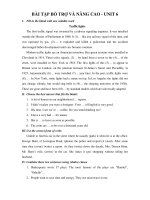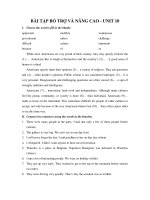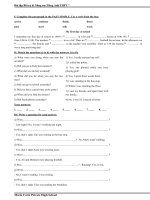Bài tập bổ trợ và nâng cao tiếng Anh - Unit 07
Bạn đang xem bản rút gọn của tài liệu. Xem và tải ngay bản đầy đủ của tài liệu tại đây (83.34 KB, 5 trang )
UNIT 07
I. Fill in the blank with one suitable word in the conversation below
On politeness
Henry: Is this your trip to England?
Robert: Yes, it is
Henry: (1)… me of the first crossing the English Channel some ten years ago. At the
time I met a man who gave me a very (2)… list of “do and don’t” which a visitor in
Britain should know. I’ve been carrying that list with me ever since
Robert: May I make a note of those “do and don’t”, please
Henry: By all means. Well, here’s the list, but I’d rather read it to you as my
handwriting is not quite readable
Robert: All right, I’m ready.
Henry: Te first rule is (3)… with the manner of addressing people. Don’t use the
words “Sir” and “Madam” in conversation with equals
Robert: What should I say then?
Henry: Say “yes, Mr. Smith” or “No, Mrs. Brown” or just “yes” or “no”
Robert: Is it true that British people avoid shaking hands?
Henry: That’s the next rule to be (4)…. A Briton will shake hands with you when he
meets you for the first time or when he makes his farewell, that is to say, when he (5)…
you for long or for good. And remember that it’s the guest who offers his (6)… first. But
isn’t quite common to shake hands when meeting a friend one hasn’t seen for six months
or so. Now the last rule is to (7)… personal subjects in general conversations
Robert: What is the safest subject of conversation then?
Henry: The weather, especially if your journey of visit doesn’t last longer than, say,
two hours
Robert: Also don’t say “please” when you want somebody to repeat a (8)… . You
must say “Sorry, but I didn’t quite catch that”, or “pardon”, or “I’m afraid I didn’t quite
hear what you said”, or “Sorry bit I missed that”
II. Choose the right word to fill in the blanks:
1. Why don’t you (take/ bring) your girlfriend with you next time? We’d love to
meet her
2. Is it all right if I (go with/ follow) you to the concert on Friday, Pam?
3. I prefer to (hire/ rent) a television than buy one
4. The answer to the crossword is on the (back side/ back)
5. Was it Bell who (invented/ discovered) the telephone?
6. I wonder if I might have a (recipe/ receipt) for the thing I’ve bought?
7. I wonder if you’d mind (bringing/ fetching) John from the next door? He’s
wanted on the telephone
8. What (more/ else) did you do in Spain, apart from swimming and sun-bathing?
III. Fill in the blanks with the following words:
accept
across
exchange
marked
originally
purpose
spread
terms
British or American English
A lot of teachers still don’t 1… American English in the classroom, and parents often
complain that in the test their children do at school American spelling is 2… as a mistake.
Most learners agree that, for the 3… teaching, the two kinds of English should not be
mixed, but teachers should not split hairs. There has been an 4… of words and phrases
5… the Atlantic going on for quite a time, and modern British English contains so much
“Americanisms” that is often difficult to draw a sharp line. Technical 6… as well as some
slang expressions from TV films have been taken over and have 7… in British English,
and often the British are not even aware that these words did not exist in their language
8…
IV. Change the word underlined with another synonym
1. The reason I like my present flat is that I have such friendly people living next
door (n…)
2. After thinking about it for a long time, I finally made up my mind to take the job
(d…)
3. Last week I was asked if I would like to go to a dancing hall (i…)
4. My sister’s daughter was take to hospital last week (n )
5. I was totally tired and word out after the football match on Saturday (e…)
6. I want you to come here without any delay (i…)
V. Use the correct form of word
The 1. (lead) of the expedition was interviewed before they left
for the Himalayas. He said, “When you have such an international team, you have to take
certain precautionary measures. It was most important that all 2.
(climb) could speak a common language. It was obligatory to have a
3. (satisfy) level of English, which is our common language. We’re
all 4. (practice) men and we avoided selecting people with only 5.
(theory) knowledge. Everyone has climbed in the Himalayas before.
We also thought it best to avoid any 6. (politics) or 7.
(philosophy) discussions. After all, we all come from quite different
backgrounds. Everyone needed a high level of physical 8. (fit) , and we
also wanted at least three man with some 9. (medicine) knowledge.
Handsruedi, Lars and Hidroshi have all worked with mountain rescue teams, and their
experience will be 10. (value) if we run into trouble. After all you
can’t send for a doctor when you’re half way up a mountain.
VI. Use the correct form of verb:
Cook, Thomas (1808 – 1892) English travel agent, who founded Thomas Cook and
Son, was born at Melbourne. Derbyshire, on November 22, 1808 (leave) school at the age
of ten, he earned his living at various jobs before starting in the travel business. In 1841
Cook chartered a train (take) people from Leicester to a meeting in Log borough on July
5. It (believe) (be) the first publicity advertised excursion train in England. Encouraged
by this and similar successes, Cook built up a travel organization which now (have)
agencies all over the world/ With the introduction of this “voucher” system, Cook laid the
foundation stone for mass tourism. A whole “package hour” to places all over the world
(can by) and (can pay) for in England, (make) travel possible and attractive to a large
number of people with little or no traveling experience. Cook died on July 19, 1892, in
Leicester
VII. Rewrite the sentences
1. Don’t you regret not learning to swim?
Don’t you wish
2. Maria will be ready any minute, and then we must leave
We must leave as soon
3. The last time I saw him was when I lived in London
I have
4. I’ve got to get a new computer
What I really
5. The play was so boring that we left in the interval
We were so
6. “Mark, could you write up the report immediately” – Peter said
Peter told Mark that
7. I last heard this song ten years ago
It has
8. This office is too small for two people
This office isn’t
ANSWER FOR UNIT 07
I. 1. reminds 2. useful 3. connected 4. remembered 5. leaves 6. hand 7. avoid 8. sentence
II. 1. bring 2. go with 3. rent 4. back 5. invented 6. receipt 7. fetching 8. else
III. 1. accept 2. marked 3. purpose 4. exchange 5. across 6. terms 7. spread 8. originally
IV. 1. neighbors 2. decided 3. invited 4. niece 5. exhausted 6. immediately
V. 1. leader 2. climbers 3. satisfactory 4. practical 5. theoretical 6. political 7.
philosophical 8. fitness 9. medical 10. invaluable
VI. 1. leaving 2. to take 3. is believed 4. to have been 5. has 6. could be bought 7. paid 8.
making
VII. 1. Don’t you wish you had learnt to swim?
2. We must leave as soon as Maria is ready
3. I haven’t seen him since I lived in London
4. What I really need to get is a new computer
5. We were so bored by that play that we left
6. Peter told Mark that he wanted him to write
7. It is ten years since I last heard this song
8. This office isn’t big enough for two people









